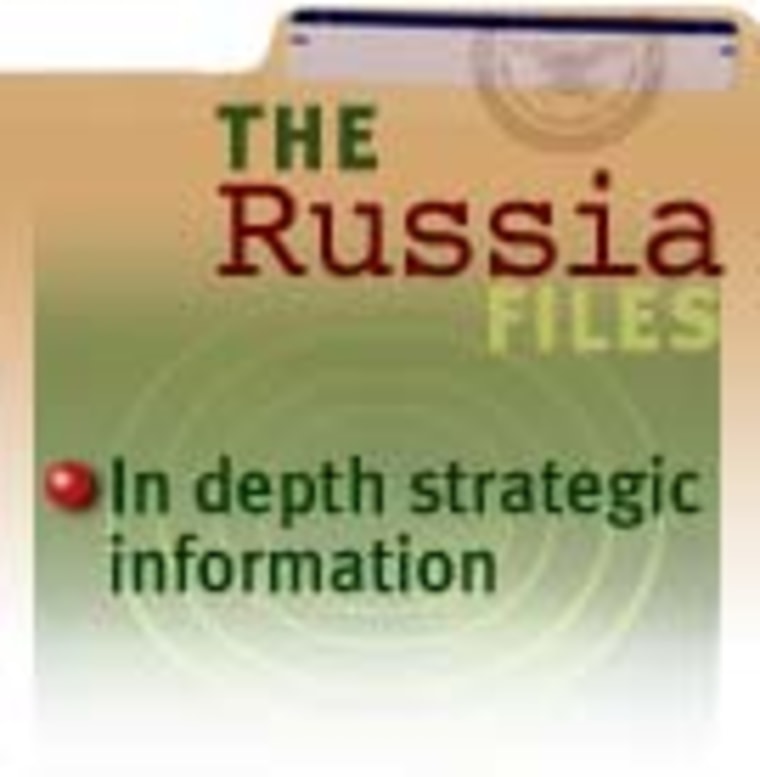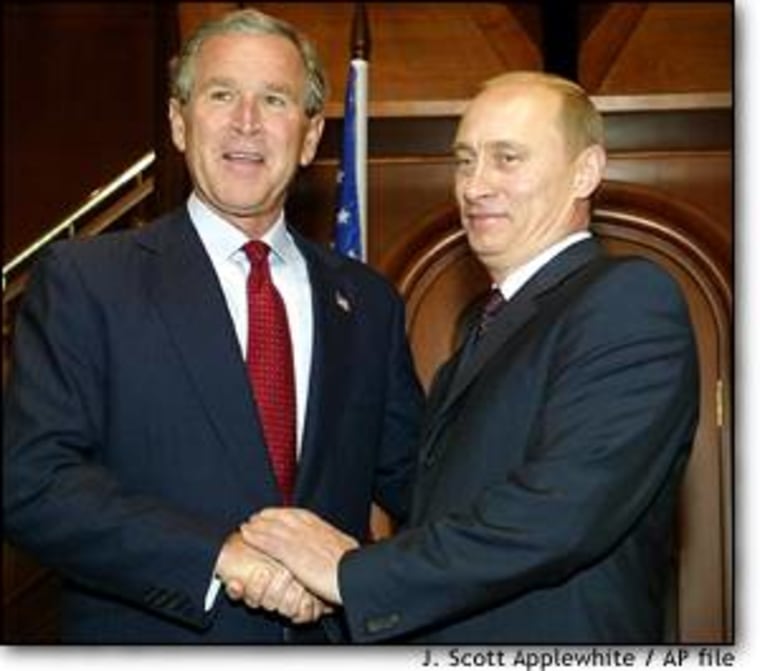The need to secure Russia’s help in the “war on terrorism” has softened the focus on events inside America’s one-time nemesis. In exchange for military and geo-political favors, the U.S. abandoned what little moral leverage it had over the behavior of post-Soviet residents of the Kremlin on issues like fair elections, a free media or the treatment of minorities. Now, with Russia’s President Vladimir Putin having jailed his main political rival for alleged economic misdeeds, what constructive role can the United States play in arresting a slide toward authoritarianism that could have awful consequences?
The move that briefly put Moscow datelines back on the front pages of newspapers the world over occurred more than a week ago: the jailing of Russia’s most powerful industrialist, Mikhail Khodorkovsky, at the time chairman of the gigantic energy conglomerate Yukos.
Like so many important developments in the past year — the faltering hunt for al-Qaida, the faltering trans-Atlantic relationship, the disintegrating Israeli-Palestinian relationship, the increasing indebtedness of the United States — news of events in Russia these days is overwhelmed by coverage of the staggering challenge the Bush administration has created for itself (and the country) in Iraq.
But this one is worth dissecting, for it says a lot about the “opportunity costs” involved in making short-term deals on terrorism with leaders willing to use the elbow room granted by Washington for less than honorable purposes.
NOT JUST ANOTHER ENRON
First, for those just “dipping in” to Russian affairs, a few important words about Khodorkovsky:
like most of Russia’s tycoons or “oligarchs,” the 40-year-old Khodorkovsky is a former Soviet loyalist who amassed his fortune in the corrupt privatization process of the early 1990s;
he was an early convert and lobbyist for to the idea that Russian companies would need to clean up their act and adhere to international accounting and commercial standards if they hoped to attract the foreign investment needed to compete in world markets;
having turned Yukos into the fourth largest oil company in the world, largely through mergers, he was in negotiations (and Yukos still is) with Exxon-Mobil for the sale of a large Yukos stake, something the American giant hopes will guarantee it a foot-in-the-door of a major non-OPEC source of oil;
he is Jewish, like Boris Berezovsky and Vladimir Gusinsky, the two other “oligarchs” targeted and largely destroyed by Putin since he took the handoff from Boris Yeltsin over in 2000;
he is a major financial backer of the two parties that constitute Putin’s main democratic opposition, and was being courted actively by the still large communist bloc as a potential challenger to Putin in the 2004 presidential elections.
SELECTIVE PROSECUTION?
Putin’s decision to move against Khodorkovsky is based, legally, on charges of fraud and tax evasion to the tune of $1 billion. There is a lot more afoot, however. Russia’s tumultuous transition from Soviet rule created a huge legal and political vacuum during the 1990s, and into it stepped previously unknown mid-level Soviet bureaucrats like Khodorkovsky, Berezovsky, and, it might be added, Putin.
Few doubt that charges against the tycoon will be difficult to substantiate, especially in a Russian courtroom. What worries those with an interest in seeing Russia move further up the democratic food chain, however, is the selective way the law is being applied.
The Bush administration is no exception, but this is a terribly inconvenient development. Bush priorities in relations with Russia to date have revolved around winning Putin’s tacit agreement to American military moves in Central Asia and Iraq, and using Russia as a foil when the prickly French cause trouble (as recently happened when the U.S. won a vote at the U.N. on Iraq in October).
Yet as the president of the party of business, champion of the energy industry — not to mention the son of the man whose legacy includes being in office when the Soviet Union collapsed — Bush can hardly allow the Yukos affair to go unmentioned. Enormous sums of American investment are at stake, not just through the Exxon-Mobil deal, but because Russia’s stock market has been a hot ticket over the past 12 months. The Bush administration has repaid Russian help in Afghanistan and other issues by smoothing the way for American aid, credits and private investment there.
So, the administration is concerned. Deputy Secretary of State Richard Armitage, who met with the head of Russia’s parliament this week, brought up the Yukos case. As a spokesman, Adam Ereli, puts it, Armitage stressed “that the case needs to be judged fairly and via due process of the law applied non-selectively.”
A POTEMKIN PROSECUTION?
The idea that Khodorkovsky just happened to be the next best target of a fair and balanced legal system strains credibility, even among those in the administration who view the relatively warm Putin-Bush friendship as an important asset.
“It’s ugly, and it’s not easy to paint it any other way,” says one such senior official, requesting anonymity. “But we have other priorities, and on balance we see stability in Russia and a friendly ear in the Kremlin as a lot more important.”
Sen. John McCain, (R.-Ariz.), freed of the inconveniences of governing, is more frank.
“Admittedly, Messrs. Gusinsky, Berezovsky, and Khodorkovsky may not provide to proponents of democracy and free markets in Russia the most laudable personal histories upon which to wage a resolute defense of our democratic principles,” he said on the Senate floor Wednesday. “But failure to defend them would acknowledge exactly what the Kremlin cynically alleges: that they are being prosecuted because of the way they made their money. What has caused these three Russian tycoons to be singled out are their activities in support of opposition political parties and free media.”
CREEPING AUTHORITARIANISM?
Human rights and pro-democracy advocates take heart from such statements. But these same people wonder where the administration is on issues involving less prominent citizens of Putin’s nation — from ethnic minorities hounded out of Moscow for lack of a residency permit, to environmental activists roughed up by police, to the millions trapped in the bloody fighting in the southern region of Chechnya.
“During his election campaign, Bush called Russia’s operation in Chechnya “not acceptable” and threatened to cut off foreign aid,” wrote Anna Neistat, the director of the Moscow office of Human Rights Watch just before the latest Bush-Putin summit in September. “Now he does not dare even to mention it.”
Indeed, the most recent State Department report on human rights catalogues many of these abuses: “There were credible reports of serious violations, including numerous reports of extrajudicial killings, by both the Government and Chechen separatists in the Chechen conflict. .. There were reports of government involvement in politically motivated disappearances in Chechnya. There were credible reports that law enforcement personnel continued to torture, beat, and otherwise abuse detainees and suspects. Arbitrary arrest and detention, while significantly reduced by a new Code of Criminal Procedure, remained problems, as did police corruption.”
WHEN TO CRY FOUL

The mitigating factor for Russia, and for other nations making the transition from authoritarian or communist rule to democracy, is that such a transition is a complex journey that will take some time to perfect. Not everyone in the vast bureaucracy, perhaps not even a majority, will be willing to let go of the old perks of authoritarian power. Eventually, though, the right leader will make it so.
This remains true. Five years ago, it was common for critics to compare Russia with the weak, democratic Weimar Republic of Germany in the 1920s — the one so complicit in Hitler’s rise to power. “Imagine the Soviet nuclear arsenal in the hands of a Hitler” went the argument, and it was, no doubt, chilling.
Back then, the idea that a former KGB colonel might take control of the country would have surprised no one inside Russia, whose citizens are famously tolerant of tyrants. Indeed, the only thing about former KGB Col. Putin’s rise to power that might have surprised the average Russian back then is the fact that he won a credible democratic election to do it.
Now that Putin and his allies — the “siloviki” — controls the Kremlin, the military and the media, it may be beyond the Russian people to cry foul when signs of abuse emerge. Corrupt or not, Khodorkovsky represented the only credible political challenger facing Putin in a country of 160 million people. Now, he’s in jail.
The West in general, and the United States in particular, have been loath criticize Putin on many things, citing the short-term need for his support. Yet while 9/11 changed many things, the nature of power is not one of them.
The famous words of a 19th century British nobleman remain relevant today: “Power tends to corrupt, and absolute power corrupts absolutely.”
Michael Moran is senior correspondent for MSNBC.com. You can request to join or be removed from the email notification list.
